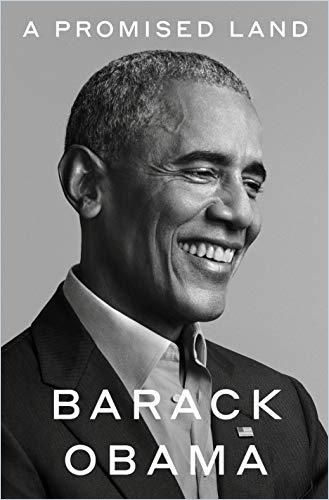Barack Obama grabs and holds your attention with his openness, absence of cynicism and willingness to share the backstage drama of his first term’s successes and failures.

Startling Candor and Grace
Here is an author who truly needs no introduction. This engaging highlight reel of former US president Barack Obama’s rise in politics and his first term as chief executive combines insights into United States’ history and civics with a revealing and personal account of Obama’s life as a father, husband and president.
This massive bestseller, which has garnered only rave reviews, was named a “best book” of the year by The New York Times, The Washington Post, NPR, The Guardian and The New York Times Book Review, among other voices. Though even Obama’s opponents would find much of interest here, if you presume that those who want to read his life story mostly will align with him politically, worthwhile related readings might include Becoming by Michelle Obama and Ruth Bader Ginsburg’s My Own Words.
For a more comprehensive ancillary read, however, those devoted to United States’ history and politics might revel in The Personal Memoirs of Ulysses S. Grant, by Civil War commanding general and later president Ulysses S. Grant. Critics and historians have long regarded it as among the most literary and compelling of American presidential memoirs. Grant’s insights make a surprisingly telling companion to Obama’s.
Upbringing
Barack Obama explains that he developed a social conscience at Occidental College, then honed it at Columbia University. He thought long and often about his country. He reveals, unsurprisingly, that he maintains his faith in its ideals, if not in its actions.
I suspect that God’s plan, whatever it is, works on a scale too large to admit our moral tribulations, that in a single lifetime, accidents and happenstance determine more than we care to admit.Barack Obama
Obama tells of enrolling in Harvard Law School and interning for the Chicago law firm that employed Michelle Robinson, initially his supervisor. In 1992, he and Michelle married.
Illinois State Senate
For eight years, Obama juggled his duties as a state senator, full-time lawyer and instructor at the University of Chicago Law School. He discusses with remarkable candor how this schedule strained his relationship with Michelle. Obama recalls their joy at the birth of their daughters Malia in 1998 and Sasha in 2001.
By 2001, Obama decided to run for US Senate. He credits luck and persistence for opening up the opportunity for him to give his now-famous nominating speech at the 2004 Democratic National Convention. Obama modestly cites his earlier memoir, Dreams from My Father, which became a bestseller, thus easing his need for daily work.
US Senate
Obama is adamant that he didn’t consider running for president until 2006, two years into his Senate term. He believed he could be an example for millions of people whom American history overlooked. He recalls his sense that this moment was his time and might not come again.
Obama credits his meetings with Middle Eastern and European leaders and his choice of experienced Senator Joe Biden as his Vice President candidate with boosting his profile. As with all his political adversaries, he writes very tactfully about Sarah Palin. Readers might yearn for dirt or hostility, but that is not Obama’s way.
From the day McCain chose her and through the heights of Palin-mania, I felt certain the decision would not serve him well.Barack Obama
Obama chronicles how the US economy deteriorated during the presidential race. He offers the heartbreaking narrative of flying to Hawaii to see his dying grandmother. Eight days later, he won election as President.
The White House
Obama makes a point – and offers an unspoken comparison with Donald Trump – by noting how accommodating President George Bush and Laura Bush were to him and Michelle during his transition to the presidency. He does not hide his frustration that, though the US economy verged on collapse, power-mad senator Mitch McConnell pledged to thwart Obama’s administration, no matter how that strategy harmed the nation.
Obama expresses genuine pride that his administration avoided another Great Depression.
Iraq and Afghanistan
Obama admits his hesitance to escalate conflict, even in Afghanistan, where he believed US involvement was necessary. He reflects on how his diplomacy resulted in a G20 economic deal and a thaw with Russia. Visits to Eastern Europe made him uneasy about populism.
While visiting the Egyptian pyramids, Obama shares that he wondered whether anything he did made any real difference. Visits to a concentration camp site and to the Normandy beaches the Allies invaded on D-Day restored his faith that – for good or evil – individuals can shape history. Obama provides revelatory moments for readers of political memoirs and history; his willingness to admit self-doubt is rare and even inspirational. When he won the Nobel Peace Prize, even as war was heating up in Afghanistan, Obama saw it as an aspirational honor.
Universal Health Care
Ultraconservatives, the medical establishment, insurers and trade unions blocked Obama’s progress on his health care legislation. Americans, Obama laments, pay more money for less health care than people in other developed countries.
To be known. To be heard. To have one’s unique identity recognized and seen as worthy. It was a universal desire, I thought, as true for nations and peoples as it was for individuals.Barack Obama
Obama discloses an inside view of legislative complexity and strategy when he breaks down how the Senate passed a watered-down version of the health care bill and sent it back to the House. Obama’s team persuaded the House to accept the Senate bill, so the president could sign it into law and not risk returning it to the Senate. Although Senate Republicans still struck elements of the law, Obama stresses that the bill’s passage began a new era in US health care.
Foreign affairs
In July 2010, Obama visited Russian leader Vladimir Putin. He conveys that he mostly listened to Putin complain about how the Bush administration treated him, but he came away believing in prospects for an improved relationship.
Obama refers to being impressed by economic progress in Beijing and Shanghai, yet disappointed by China’s autocratic surveillance society.
The Tea Party
Obama understands that most Americans seethed at how Wall Street’s rich got off the hook while many ordinary people suffered during the economic downturn. He has no false modesty about his team’s Wall Street Reform and Consumer Protection Act. Obama calls it the most significant change to the financial sector’s rules in half a century.
Contemplating the BP Deepwater Horizon oil spill that did tremendous damage in the Gulf of Mexico, Obama sadly concludes that most Americans prefer high-consumption lifestyles over environmental protections.
With equal unhappiness, Obama notes that with 180,000 troops deployed in overseas wars and unemployment at 9.5%, Democrats lost a historic 63 House seats in midterm elections and thus forfeited their congressional majority. Even so, he praises his team for achieving ratification of the Strategic Arms Reduction Treaty with the USSR and passing almost 100 other laws in the last months of his second year in office.
Osama bin Laden
Obama details how, in late 2010, US intelligence spotted a tall, bearded figure in a compound near Islamabad, Pakistan. The former president vividly relates the tension of watching from the White House as a SEAL team identified and killed bin Laden.He reveals a lot about his personal perspective when he acknowledges that finding bin Laden, while a meaningful triumph, proved less satisfying to him than the passage of his health care bill.
Obama passionately believes that the energy and expense poured into war could transform the United States if Americans had unity of purpose.
Sometimes I’d fantasize about walking out the east door and down the driveway, past the guardhouse and wrought-iron gates, to lose myself in crowded streets and re-enter the life I’d once known.Barack Obama
Describing his increasing concern at the increase in US tribalism and division, he makes no secret of his dismay about “carnival barker” Donald Trump and his tactics.
Gravitas and Sanity
This hefty volume is a genuine page-turner. Obama offers many surprising facts, tales and insights. No matter how much you know about politics and world events, he will take you into many places you couldn’t otherwise enter and leave you eager for Volume Two. Obama’s calm, expressive journey – 700 pages of self-aware gravitas and sanity – provides welcome relief from the daily contention of today’s political discourse.





